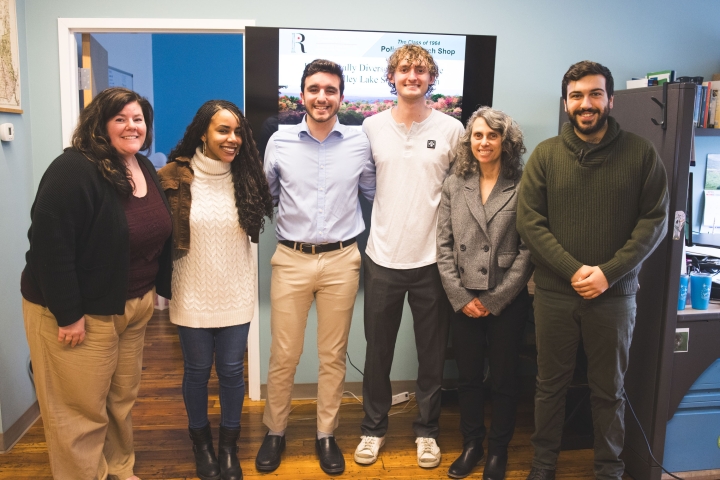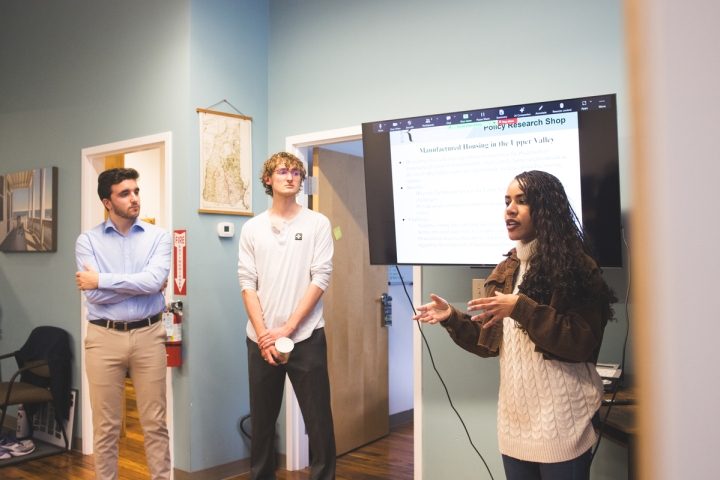In the midst of a regional and national housing crisis, how can New Hampshire and Vermont towns in the Upper Valley create affordable housing for a larger, more diverse, and more mobile workforce while also considering budget-conscious development, the rural nature of the region, and the desire of many towns to maintain their traditional character?
It’s a daunting task. But a trio of Dartmouth students—Hawa Hamidou Tabayi ’26, Jonah Manso ’25, and Quinn Allred ’26—working in the Class of 1964 Policy Research Shop offered possible solutions in a presentation last week to the Upper Valley Lake Sunapee Regional Planning Commission in Lebanon, N.H.
Renée Theall, a housing navigator, and Austin Ford, a GIS analyst and data manager, represented the commission.
Students with the Policy Research Shop, which is part of the Nelson A. Rockefeller Center for Public Policy and the Social Sciences, offer nonpartisan, pro bono research services on a policy relevant topic to a range of clients, including Vermont or New Hampshire legislators, judges, and other policy-oriented organizations, said PRS director Kristin Smith, who is also a visiting associate professor of sociology. “We are thankful to the Dartmouth Class of 1964 for their generous class gift, which ensures that PRS students will continue to produce high-quality, nonpartisan policy research,” Smith says.
This academic year, the PRS is sponsoring nine research projects that include such issues as flood resilience and regulating PFAS, aka “forever” chemicals, in Vermont, and in New Hampshire, a court navigator pilot project assessment for the New Hampshire Supreme Court, and managing and processing out-of-state waste.
The goal of a research project, Smith said, is to give students “hands-on applied experience” and teach them how to conduct interviews, synthesize their results, and present their findings to policymakers in a succinct and clear manner.
Beginning last fall, the trio of students making the housing presentation in Lebanon gathered and sorted data, interviewed experts on the Upper Valley housing market and town officials via Zoom, and looked at case studies of affordable housing in Connecticut, Texas, and Vancouver. They focused on 26 New Hampshire municipalities and divided them into small towns with a population of 1,500 or less, medium towns with a population between 1,500 and 5,000, and large towns with a population of 5,000 and greater.
“We analyzed the data to understand housing-related factors considered for new housing development based on town size and other variables,” Allred said.
According to the U.S. Department of Housing and Urban Development, affordable housing, including utilities, should cost no more than 30% of an individual or family’s gross income. For many, this is hard or impossible to sustain. The students’ research found that middle-income workers had the most to gain from an increase in available housing.
The rural nature of the Upper Valley, with its abundance of more expensive second homes and the ever-present influence of NIMBYism, aka not-in-my-back-yard, makes it a challenging place to construct new housing, however.
“Town administrators confirmed to us that wealthy second-home owners will often try to block affordable housing plans that could lower their own property values. That’s a barrier we will attempt to address through our case studies,” said Manso.

There are other barriers, which include transportation costs to the main employment hub of Lebanon and Hanover from the outer ring of more affordable towns, the preeminence of zoning for single-family homes, and the poverty rates in small, medium, and large towns.
The students settled on three possible models that could be employed in the Upper Valley: prebuilt, lower-cost manufactured housing, which increased housing density in Groton, Conn.; pattern zoning, which permitted the building of pre-approved building types in designated zones in the college town of Bryan, Texas, home to Texas A&M University; and taxing second homes in Vancouver, Canada, which was intended to give homeowners the incentive to either rent or sell the properties. Each approach had advantages and flaws.
The upshot, said Allred, was that anyone looking at solutions for housing needed to make proposals as “regionally specific” as possible.
A town could, for example, establish regulations to encourage manufactured housing that would look similar to the housing already there, said Tabayi. It could also increase the second-home tax, and use that revenue to build affordable housing.
“We feel that these strategies, along with accessory dwelling units already existing in the Upper Valley, would allow for the housing crisis to be properly addressed,” Tabayi added.
“Local control is very predominant,” said Renée Theall. “Towns are very interested to hear what nearby or similar-sized towns are doing. They don’t like a state-wide policy, they want local control but they also want to make sure they’re not the only ones making changes.”
The other projects in the works for the Policy Research Shop this year are:
- Nuclear power in New Hampshire
- Variation in paid family and medical leave program models
- Banning e-cigarettes in Vermont
- Community power aggregation policies and environmentally sustainable energy in New Hampshire
